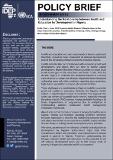| dc.description.abstract | Some economists see education mainly in its consumption aspect. In their view it is a public service, often a very costly one, and it is part of overhead costs of development. Seen in this light, educational expenditure ought to be confined within as narrow limits as possible so that productive investment shall not be handicapped. This standpoint is somewhat reflected in the structure of national accounting. In fact, in national accounts only the expenditure financing fixed capital formation (building construction, equipment etc.) and the variation of stocks, is reckoned as investment. All expenditure having another purpose is held to be consumption expenditure. Thus, according to the criteria of national accounting, only that part of educational expenditure used for the acquisition of immovable property, such as school buildings, would come within the investment calculation. The recurrent expenditures which constitute the major part of educational costs are, on the other hand, counted under the heading consumption. | en |
| dc.title | The Role of education on economic development | en |
| uneca.subject.fulltaxonomy | UNBIS::EDUCATION::EDUCATIONAL POLICY AND PLANNING::EDUCATIONAL PLANNING | en |
| uneca.subject.fulltaxonomy | UNBIS::EDUCATION::EDUCATIONAL POLICY AND PLANNING::EDUCATIONAL PLANNING | en |
| uneca.subject.fulltaxonomy | UNBIS::EDUCATION::EDUCATIONAL POLICY AND PLANNING::EDUCATIONAL PLANNING | en |
| uneca.subject.fulltaxonomy | UNBIS::EDUCATION::EDUCATIONAL POLICY AND PLANNING::EDUCATIONAL DEVELOPMENT | en |
| uneca.subject.fulltaxonomy | UNBIS::EDUCATION::EDUCATIONAL POLICY AND PLANNING::EDUCATIONAL DEVELOPMENT | en |
| uneca.subject.fulltaxonomy | UNBIS::EDUCATION::EDUCATIONAL POLICY AND PLANNING::EDUCATIONAL DEVELOPMENT | en |
| uneca.subject.fulltaxonomy | UNBIS::EDUCATION::EDUCATIONAL POLICY AND PLANNING::EDUCATIONAL PROGRAMMES | en |
| uneca.subject.fulltaxonomy | UNBIS::EDUCATION::EDUCATIONAL POLICY AND PLANNING::EDUCATIONAL PROGRAMMES | en |
| uneca.subject.fulltaxonomy | UNBIS::EDUCATION::EDUCATIONAL POLICY AND PLANNING::EDUCATIONAL PROGRAMMES | en |
| uneca.subject.fulltaxonomy | UNBIS::EMPLOYMENT::EMPLOYMENT PROMOTION AND PLANNING::MANPOWER DEVELOPMENT | en |
| uneca.subject.fulltaxonomy | UNBIS::EMPLOYMENT::EMPLOYMENT PROMOTION AND PLANNING::MANPOWER DEVELOPMENT | en |
| uneca.subject.fulltaxonomy | UNBIS::EMPLOYMENT::EMPLOYMENT PROMOTION AND PLANNING::MANPOWER DEVELOPMENT | en |
| uneca.subject.fulltaxonomy | UNBIS::EMPLOYMENT::EMPLOYMENT PROMOTION AND PLANNING::MANPOWER PLANNING | en |
| uneca.subject.fulltaxonomy | UNBIS::EMPLOYMENT::EMPLOYMENT PROMOTION AND PLANNING::MANPOWER PLANNING | en |
| uneca.subject.fulltaxonomy | UNBIS::EMPLOYMENT::EMPLOYMENT PROMOTION AND PLANNING::MANPOWER PLANNING | en |
| uneca.subject.fulltaxonomy | UNBIS::GEOGRAPHICAL DESCRIPTORS::AFRICA | en |
| uneca.subject.fulltaxonomy | UNBIS::GEOGRAPHICAL DESCRIPTORS::AFRICA | en |
| uneca.subject.fulltaxonomy | UNBIS::GEOGRAPHICAL DESCRIPTORS::AFRICA | en |
| uneca.creatorCorporate.fulltaxonomy | Corporate Authors::United Nations. Economic Commission for Africa. African Institute for Economic Development and Planning(IDEP) | en |
| ags.creatorCorporate | United Nations. Economic Commission for Africa. African Institute for Economic Development and Planning(IDEP) | en |
| ags.subjectClassification | 11.01.00 EDUCATIONAL POLICY AND PLANNING | en |
| ags.descriptionNotes | Conference of African planners First Session Dakar, 16 - 27 November 1964 | en |
| ags.publisherPlace | Dakar | en |
| ags.publisherName | UN. IDEP | en |
| dc.date.accessioned | 2019-08-29T12:55:27Z | |
| dc.date.available | 2019-08-29T12:55:27Z | |
| dc.date.issued | 1964-11 | |
| dc.identifier.uri | https://hdl.handle.net/10855/42587 | |
| dc.format.extent | 13 p. | |
| dc.language | eng | |
| dc.type | Reports | |
| uneca.workflow.processed | true | |
| ags.creatorPersonal | Sammak, André | |
| ags.availabilityNumber | b11931516 | |
| ags.availabilityNumber | 1964 | |
| ags.availabilityLocation | IDEP | |
| ags.rights.termsofuse | public | |
| ags.JN | b11931516 | |
| uneca.language.supported | en | |




